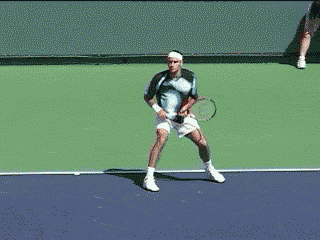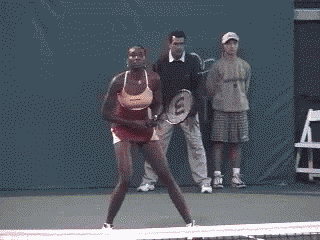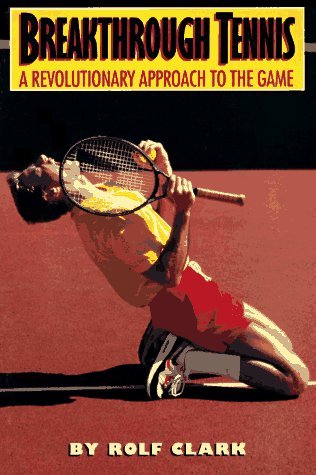|
TennisOne Lessons The Key to Winning Don't Be Afraid of Losing Rolf Clark You can lose in tennis by concentrating too much on winning -- winning this point, winning this game, winning in general. In fact, the real key to winning is not to be afraid of losing. Let's explore this. There's nothing wrong with a desire to win. It's an obsession with winning that causes problems, and it inflicts damage at two levels.
The first level deals with specific shots. Too often the need to win makes you intent on winning a point by hitting the ball to an open spot and “putting it away.” You're concentrating on where you want the ball to go and hitting it hard to make it go there. That need to win the point puts your mind on the target, which distracts you from focusing on making good contact with the ball. Instead, you ought to be concentrating on the present, focusing on the racquet hitting the ball, and not on where the ball goes. Forget about aiming during the impact. Your body and mind, working together, will instinctively know where in your opponent's court to put the ball. You implicitly determine where to hit the ball during the time interval between the opponent’s impact of the ball and the ball bouncing on your side. That’s when the aiming should take place, not during your swing. The second level at which the obsession with winning causes problems involves the overall attitude about winning or, to be more accurate the fear of losing. It concerns self-image. (I acknowledge that there are very secure people for whom self-image is not a distraction. This is for the 90 percent who are not that lucky.) Even though you know you should be focusing on driving your racquet through the ball instead of on putting the ball away, you find it hard to do that time after time. That's because there's a bigger mental game often going on, and it has to do with image…with looking good. It mostly happens in matches you "should" win, or when you are ahead 5-1 in the third and suddenly lose your serve. You then may start to worry about not winning if winning drives you. You don't play well when you are thinking about how you are doing and how your performance stacks up with your expectations for yourself. Such thoughts can creep into the back of your mind and undermine your play even when you are trying to concentrate on hitting the ball. Detach "Good" and "Bad" From Winning and Losing
I believe it is human nature to attach meaning to whether you win or lose. When you win, you tend to believe something like, "I look good." When you lose, it's more like "I look bad." (For the moment withhold judgment on whether or not you think what I'm saying is true or not. Just stick with me and explore this concept.) Does winning or losing at tennis really mean anything? Yes, it means something if you're a professional and your livelihood depends on winning. But for most of us, whether we win or lose really doesn't mean anything to anyone but ourselves. My losing doesn't mean nearly as much to someone else as it does to me. If I attach the meaning "I look bad" to losing, then I'll be afraid of losing and will play badly because my mind starts being concerned with my image instead of on executing shots. Let go of the need to win, and you'll be able to concentrate on hitting the ball. What should matter to you is playing well, in that way, anyone who beats you will know they played well. A sense of tennis integrity enters the game. Playing becomes more important than the results of playing. Winning Is Still More Fun
I am not saying you shouldn't care if you win or lose. The desire to win should be strong and the result of winning fun. Those feelings are different, though, from attaching meaning or significance to the final score. Fun and desire are emotions, not conclusions. "I should have won" is a conclusion. You're passing judgment on yourself instead of enjoying the event. Choking The negative feelings you attach to losing can cause you to choke. Instead of concentrating on play, you become self-conscious and begin to worry about image. But if you attach no meaning to losing, then choking and playing poorly will not control your play. Here are suggestions for those who do choke. First, admit it to yourself (and that itself is not easy to do). Second, a good way to avoid choking is to let it be okay to choke. Don’t attach meaning to it. I have found it useful to tell myself “this is what choking feels like”, and then to explore the feeling. Simply being aware of the concept that losing is meaningless will enable you to avoid the pitfalls of self-destructive thoughts. But you've got to do more than acknowledge the concept intellectually. Understanding is not enough. You must become someone for who losing is truly meaningless, rather than someone who just understands it should be meaningless. How Do You Get There?
I believe that this approach, that allowing losing and winning to be meaningless, pays off. But only you can explore it, that is, allow yourself to stop attaching meaning to losing. You start by accepting the possibility that this is an area worth exploring. Accept the possibility that there is a breakthrough available here -- and explore the possibility. It takes time, just as it takes time to improve other components of your tennis game. But a warning. While changing the physical game is not always easy, changing the mental game is even more difficult. It's even difficult to try out the concept that you may be holding yourself back by being driven by the need to win, the need to “not look bad." Yet it is a concept that can pay off in significantly more wins. Your comments are welcome. Let us know what you think about Rolf Clark's article by emailing us here at TennisOne.
|



